An attorney in fact is a person who has been granted legal authority to act on behalf of another individual. This role is typically appointed when an individual is unable to make important decisions for themselves, either due to physical or mental incapacity. In this document, we will explore the responsibilities and duties of an attorney in fact, as well as the process of obtaining power of attorney and the different types that exist.
What is an attorney in fact?
An attorney in fact, also commonly known as a power of attorney or POA, is an individual who has been legally appointed to act on behalf of another person. The person granting the power of attorney is referred to as the principal, while the appointed individual is known as the agent or attorney in fact.
The role of an attorney in fact may vary depending on the specific power of attorney document. In general, their responsibilities include managing the principal’s financial and legal affairs, making decisions on their behalf, and carrying out tasks outlined in the power of attorney document.
An attorney in fact is typically appointed when a person is unable to make decisions for themselves due to illness or incapacitation. This allows them to have someone they trust handle important matters on their behalf.
Difference between attorney-in-fact vs power of attorney?
The terms attorney in fact and power of attorney are often used interchangeably, however there is a subtle difference between the two. An attorney in fact refers to the individual who has been appointed as an agent under a power of attorney document.
On the other hand, power of attorney refers to the legal document itself that grants someone the authority to act on behalf of another person. This document outlines the specific powers and responsibilities granted to the appointed individual.
It is important to note that a power of attorney can be limited or general, depending on the wishes of the principal. A limited power of attorney grants specific powers for a designated period of time, while a general power of attorney grants broader authority to handle all financial and legal matters.
What are the Types of Power of Attorney ?
- General Power of Attorney: grants broad authority to the appointed individual to handle all financial and legal matters on behalf of the principal.
- Limited/Special Power of Attorney: grants specific powers for a designated period of time or specific tasks
- Durable Power of Attorney: remains in effect even if the principal becomes incapacitated, making it a useful tool for estate planning.
- Springing Power of Attorney: only goes into effect when a specific event or condition outlined in the document occurs, such as incapacity of the principal.
- Medical Power of Attorney: grants the appointed individual authority to make medical decisions on behalf of the principal in case of incapacitation.
- Financial Power of Attorney: grants the appointed individual authority to handle financial matters such as paying bills and managing investments on behalf of the principal.
Who can act as an attorney-in-fact?
Any individual who is of legal age and has the mental capacity to understand and carry out their responsibilities as an attorney in fact can act in this role.
It is common for family members, close friends, or trusted advisors to be appointed as an attorney in fact.
Some individuals may choose to appoint a professional such as a lawyer or accountant to act on their behalf if they have complex financial or legal matters that need to be managed.
It is important to choose someone who is trustworthy and capable of carrying out the responsibilities outlined in the power of attorney document.
In some cases, an individual may appoint multiple attorneys in fact to act jointly or separately for different tasks.
An attorney in fact does not have to be a lawyer or have any legal background, but they should be able to handle financial and legal matters competently.
The designated attorney in fact can also choose to decline the role if they do not feel comfortable or capable of fulfilling their responsibilities.
It is important for the principal to regularly review and update their power of attorney document as needed, including appointing a new attorney in fact if necessary.
What is the License for attorney in fact real estate?
There is no such requirement to obtain any kind of license specifically for an attorney in fact to handle real estate matters. However, the appointed individual must have the legal capacity and authority granted by the principal through a valid power of attorney document. Additionally, some states may require that certain real estate transactions be handled by a licensed attorney, so it is important to consult with local laws and regulations.
Conclusion
In conclusion, an attorney in fact plays a crucial role in managing the financial and legal affairs of a person who is unable to make decisions for themselves. They are appointed through a power of attorney document, which outlines their specific responsibilities and powers. There are various types of power of attorney, each with its own purpose and limitations. Anyone who is legally able to understand and carry out their duties can be named as an attorney in fact.

Corey has over 15 years of experience as a real estate broker and educator. He is dedicated to providing valuable insights and guidance for those looking to enter the real estate industry.

